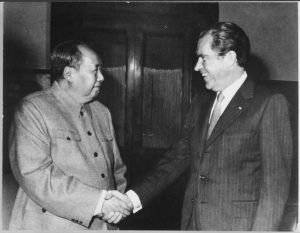In 1967, the American political philosopher and geopolitical strategist James Burnham collected some of his articles that originally appeared in National Review into a book entitled The War We Are In. Burnham had been writing for National Review since the magazine’s founding in 1955. He wrote a regular column entitled the “Third World War,” which he described as “a kind of notebook of running commentary on the events, problems, methods and prospects of the war we are in.” The war he described and attempted to explain was what was most commonly called the Cold War — the war that supposedly ended in 1989-1991 with the collapse of the Soviet empire.
Burnham traced the roots of the Cold War to “Lenin’s organization of the Bolshevik faction of the Russian Social Democratic Labor Party in 1903” and his seizure of power in Russia in November 1917. That began, in Burnham’s words, “the protracted war of the communist enterprise for a monopoly of world power.” A key event in that war was the communist conquest of China in October 1949. Lenin had written in 1923 that in the end the communist-capitalist struggle would be decided in Asia because that is where most of the world’s people lived.
Burnham noted in Mackinder-esque fashion that by 1967 the communist empire “consolidated as its base the most powerful strategic position on earth” — the Eurasian Heartland. Fortunately for the West, the Sino-Soviet bloc splintered. Burnham quite early on recognized the fissures within the communist empire, and urged the United States and the West to exploit the intra-communist rivalry. A few years after The War We Are In appeared, the Nixon administration helped widen the Sino-Soviet split, and thereafter the People’s Republic of China (PRC) acted as a de facto ally of the United States until the fall of the Berlin Wall. Had the Sino-Soviet bloc not splintered, it is doubtful that the Cold War in Europe would have ended how and when it did.
The main theme of the two original chapters in The War We Are In is that throughout much of the Cold War the United States did not recognize that it was at war with the communist empire. U.S. policymakers and citizens viewed “war” much more narrowly than the communists did. For Americans, war meant kinetic war — until the guns started firing and the bombs exploded, the conflict was something less than war. Burnham, a former Marxist (of the Trotskyite faction) knew that the communists viewed war in much broader terms; it encompassed political, psychological, cultural, economic, and subversive aspects, too. He called the Cold War an “omni-dimensional” conflict.
Burnham noted that it was a “long-term global psycho-political campaign that deceived Western opinion and diverted Western nations from deterrent intervention” that helped the Communist Party seize power in China. In the mid-1930s, Burnham recounted, articles in Western periodicals and newspapers portrayed the Long March and Mao Zedong’s Yan’an government in positive terms that hid “the truth about communism’s goal and strategy.” During and after World War II, the deception continued and intensified. Chinese communism, Americans were told, was “an authentic, nationalistic … development.” Mao’s Party was not so much communist as agrarian-populist, whereas Chiang Kai-shek’s government was repressive and reactionary. This campaign — aided and abetted by agents of influence within the U.S. government and sympathetic journalists — “had a pervasive influence … on American and Western policy toward China during the war and postwar years.”
Burnham viewed the Sino-Soviet split as an internal struggle within the communist empire, even after Nixon’s opening to China. Burnham died in 1987, two years before the Berlin Wall came down. Judging by his analysis in The War We Are In, Burnham would not have declared an end to the Cold War in 1989-1991. Instead, he likely would have viewed the fall of the Soviet Union as a Western, but also a Chinese, victory.
Burnham would have noted that communism survived in China. Beijing’s chief rival within the communist movement was eliminated; the communist drive for global power, however, continued. After the calamities of the Cultural Revolution, China engaged in its version of Lenin’s New Economic Policy, but the Leninist-Maoist dictatorship of the proletariat revealed its true self during the 1989 Tiananmen Square massacre. Meanwhile, the Chinese Communist Party (CCP) adopted a form of state-capitalism that produced economic growth and larger military budgets.
Since the fall of the Soviet Union, the CCP has conducted a psycho-political campaign to convince the United States and the West that China is no longer a communist country. And until recently, that campaign was hugely successful. Increasingly aggressive PLA Navy moves in the South China Sea coupled with a geopolitical offensive called the Belt and Road Initiative, and evidence of the CCP’s deception related to the global spread of COVID-19, however, have awakened some Americans and Westerners from their strategic sleep.
Chinese President Xi Jinping has accumulated more power than any Chinese leader since Mao. China is cracking down on dissidents, including most recently in Hong Kong. The dictatorship of the proletariat is alive and well in China. The CCP’s goal, as Burnham would surely have understood, is to replace the United States as the world’s leading economic and military power and ultimately to achieve what Burnham called a “monopoly of world power.”
The European phase of the Cold War ended in 1989-91. The Asian phase of the Cold War is “the war we are in.”
Francis P. Sempa is the author of the books “Geopolitics: From the Cold War to the 21st Century” and “America’s Global Role,” and has written frequently on history and foreign policy for the Asian Review of Books, the University Bookman, the Claremont Review of Books, The Diplomat, the South China Morning Post, Orbis, Joint Force Quarterly, Strategic Review, the New York Journal of Books, and other publications. He is a federal prosecutor and an adjunct professor of political science at Wilkes University.

































